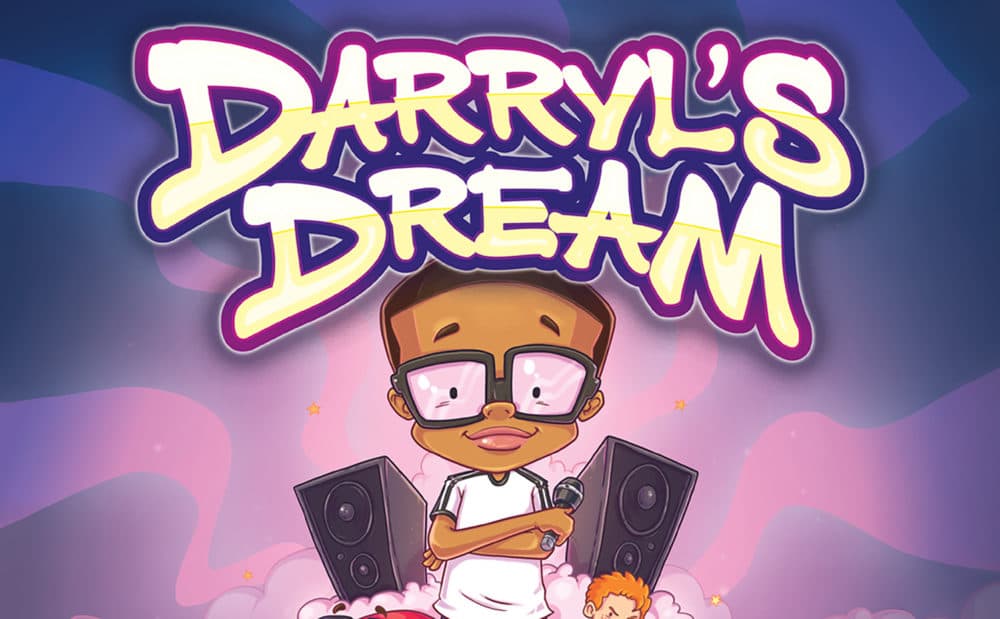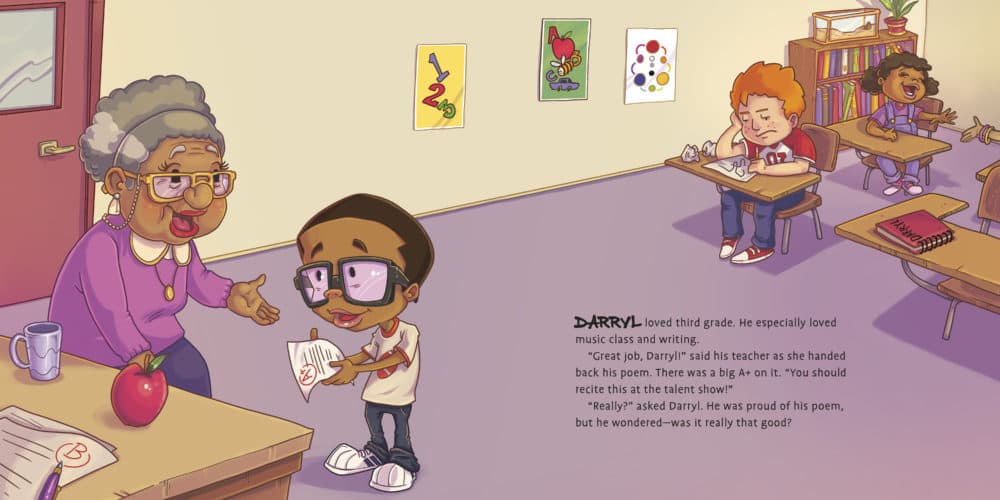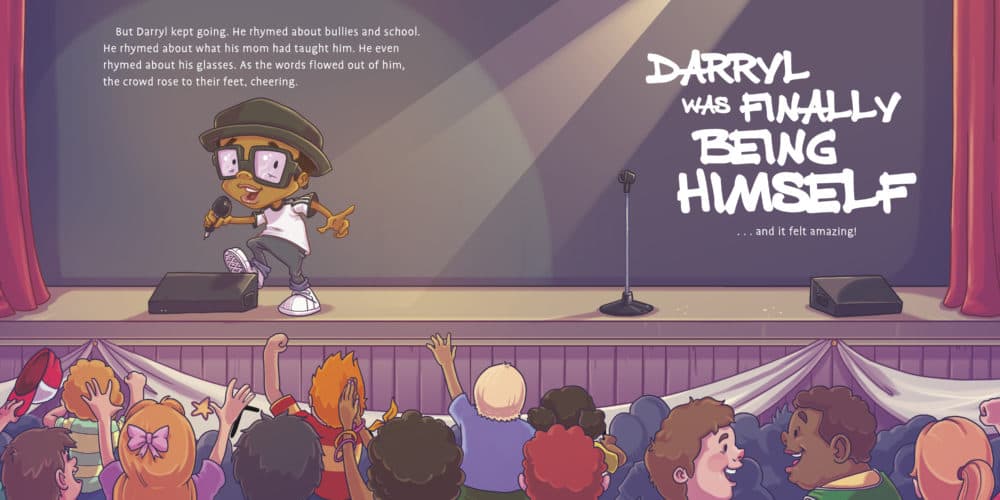Advertisement
From rhymes to reading: Run-DMC's Darryl McDaniels publishes children's picture book

This segment was rebroadcast on Aug. 22, 2023. Click here for that audio.
Back in 2007, MTV named Run-DMC the greatest hip-hop group of all time — but Darryl McDaniel wasn’t always feeling the love from his peers.
McDaniels recently published his first children's book, “Darryl's Dream.” The book stars a third-grader named Darryl. He's a poet and the kids at school bully him because he wants to sign up for the talent show. He's got chunky glasses — reminiscent of McDaniels’ signature look.
That’s because the character is him, minus the passion for poetry. But the bullying is true to life: Bullies picked on McDaniels for his glasses, his love of comic books and his status as a straight-A student on the honor roll.
“Before I started bragging about my glasses on records, when I was a kid, it was ‘hey four eyes,’ ‘hey, binoculars,’ ‘hey, telescope,’ ” he says “It was the worst.”
McDaniels says he remembers all of these “knuckleheads” who made him feel worthless to this day. At home, McDaniels had a good life with his loving parents who didn’t tell him he was adopted until he was 35.

When Run-DMC first introduced themselves to the world, McDaniels declared “I'm D.M.C. in the place to be / I go to St. John's University / And since kindergarten I acquired the knowledge / And after 12th grade I went straight to college.”
The children’s book came from the realization that he’s always utilized real situations from his life — whether it’s Christmas time in his neighborhood of Hollis, Queens or making the world smile by dissing McDonald’s.
“I was born son of Byford, brother of Al / Bad as my mamma and Run's my pal / It's McDaniels, not McDonald's / These rhymes are Darryl's, those burgers are Ronald's”
- Darryl McDaniels, Son of Byford
If people know him from high school to college to performing with Aerosmith, McDaniels realized he could talk about himself during grade school.
“But I don't have to do it on a song. Maybe if I put it in a book so that when the kids read it, it's in their scenarios,” he says. “I'm just letting them know about the young DMC, who's no different from any man, woman, boy or girl on the face of the Earth.”
'If you remove guilt and shame, you remove the pain'
People didn’t see celebrities when they looked at Run-DMC, McDaniels says, and that’s part of what made the group so popular. Run-DMC rapped about school and family — things everyone could relate to — as well as poverty and crime on occasion.
“We never told anybody, ‘You're wrong for being in a gang. You're wrong for stealing and lying.’ ” he says. “We showed them the alternatives and options so that they could tap into their own greatness.”
McDaniels gets credit for shaping music and shaping popular culture in his career. Run-DMC’s cover of Aerosmith's “Walk This Way” was a touchstone for the fusion of rock and rap.
People from all around the world told McDaniels, “When Steven Tyler took the microphone and knocked down the wall that was separating y'all in that video. That didn't just happen in the video or the record. It happened in the world,” he says.
Advertisement
The two groups contradicted the misconception that only Black people do hip-hop and white people do rock ’n’ roll.
“Once Aerosmith connected with our generation through hip-hop, it opened up the rainbow for all the generations to follow,” he says. “We changed fashion, we changed music, and we changed the way pop culture looks at and respects each other.”
But even after all of his success, back in 2017, McDaniels wrote a memoir called “Ten Ways Not to Commit Suicide.”
Despite his achievements, McDaniels says he didn’t feel good about himself. His feelings of guilt and shame led him to drink excessively to get him through the depression.
“From 1993 to 2004, I was an alcoholic, suicidal, metaphysical wreck,” he says, “drinking myself to death, wanting to commit suicide.”
When he went to rehab to stop drinking, McDaniels found a powerful tool.
“I discovered this thing called therapy,” he says, “and it allowed me to admit I'm scared, I'm vulnerable, I'm weak, and it felt so good. I went in there and confessed all my weaknesses and fears, and I walked out of there like the Incredible Hulk.”
McDaniels no longer experiences suicidal thoughts, but he says he still sometimes feels like he’s not worthy or that he can’t get through life’s challenges. Acknowledging those feelings helps him understand what’s causing them.
“If you remove guilt and shame, you remove the pain,” he says.

An important part of the children’s book is addressing the feelings kids have at a young age that can follow them through life if left unaddressed, he says.
“That same anxiety that had you scared of going to fifth-grade class will come back to haunt you when you're that doctor in that operating room or when you got to wake up the next morning and go to work,” he says.
After everything he’s achieved, McDaniels’s legacy is the furthest thing from his mind. He doesn’t have anxiety anymore because he stopped caring about the end result, after years of people pushing him to press for more money and accolades.
“All you need is to be happy about what you are doing. I'm at a point in my life where I realized a lot of the things that we worry about is just that — things that we worry about,” he says. “Let me not worry about the result. Let me not worry about where Imma go. Let me just think about what I want to do.”
If you or someone you know may be considering suicide, contact the National Suicide Prevention Lifeline at 1-800-273-8255 (En Español: 1-888-628-9454; Deaf and Hard of Hearing: 1-800-799-4889) or the Crisis Text Line by texting 741741.
McDaniels will be doing a reading of “Darryl’s Dream” at a virtual event on Saturday at 1 p.m. ET. For more information click here.
Emiko Tamagawa produced and edited this interview for broadcast with Todd Mundt. Allison Hagan adapted it for the web.
This segment aired on February 4, 2022.


